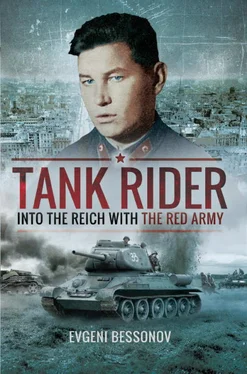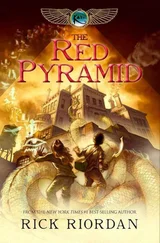Unfortunately, in the last quarter of the 1941 school year we stopped all sports activities – we had to prepare for graduation exams. After a long discussion, several guys from my class, including me, decided to apply for the Sevastopol Navy Academy, but I did not pass the medical commission – they said I had colour-blindness, rather insignificant, though. Nevertheless, the commission found me unfit for service in the Navy and Air Force (I also tried to enter a pilot club). We schoolmates did not think of war, believing that war would take place on the enemy’s territory, and we were light-hearted then. I passed all my graduation exams with distinction, except for Russian literature composition. The graduation party took place on 17 June and we received our ‘Maturity certificates’. The war started five days later.
THE WAR BEGINS

Ifirst heard that the war had broken out while I was in the city, where I had gone with Vladimir Grivnin, my classmate – we had plans to go to a retro film theatre, which was at Nikitski Gate. We young boys took the news quite calmly, we thought that the Nazi invaders were about to be thrown back from the country’s borders. But exactly the opposite happened. This conflict, the harshest of all wars, would last 1,418 days for us, or 3 years, 10 months and 17 days.
On 25 or 26 June, 1941, I, along with other Komsomol members, was invited to the Baumanski district committee of Komsomol. There they suggested that we go to the Bryansk region to build fortifications. On the evening of the same day we were loaded on to a train with some personal belongings and food; we travelled westwards to build fortifications. We started to work at Kirov city in the Bryansk region. We worked twelve hours a day, and as we were not used to physical labour, we were really exhausted. We fell asleep as soon as our heads touched our ‘beds’ of hay or straw, which were made mostly in barns. We dug anti-tank ditches, dug around the riverbanks, dug trenches and set barbed-wire obstacles. In some cases we had to repair the railways destroyed during air raids and clear them from the debris of destroyed goods trains. However, our main job was to dig anti-tank ditches. The food was poor, it was not enough for us and the village population was not very kind to us. Our foreman, who arrived with us from Moscow, had to talk to the locals, mostly to leaders of the kolkhos (collective farm) or village, if they had not been drafted into the army, and persuade them to give us some food, at least potatoes. Such talks helped, but quite rarely. The German air force bombed us several times: scared, we ran in all directions like rabbits. We were young and healthy and could run fast. We did not suffer any losses, especially as the bombs exploded far away from us, but as we had not seen fire, we were quaking in our boots. We worked there for 45 days, until 8 August, 1941, and then were urgently loaded on a train and in the morning of 9 August we were back in Moscow, at Kiev station. College students were drafted in the army on the spot and were sent to different units.
When we, five to seven young men, walked into a metro train, passengers started to pay attention to us. We were dirty and ragged, in patched-up shirts and trousers, our hair grown long and dirty and tangled. However, women came up to us and started to ask us who we were where we were from. When they learnt that we were from the labour front, they, just like all mothers, started to ask us about their children, but we had not known or seen anyone that they were asking about. When I came home, there was already an official paper that said that I had been drafted into the Red Army and had to show up at the assembly point in school in Takmakov lane by 11 August. That was the assembly point for the Baumanski district military commissariat of Moscow. Some neighbours in the street and classmates also received similar call-up notes.
During the night of 12 August we were loaded on to a train, taking our places in freight wagons (for 40 men or 8 horses) and we rolled eastwards. On the way individual cars were taken away as the men were sent to different military academies. Alexander Fokin left our company this way. In the vicinity of Chelyabinsk we were quartered in tents at the Chebarkulski military camp, where army units of the Urals Military District stayed during the summer. Before the cold weather set in, we lived in that camp, mostly doing drill. We still had civilian clothes. With the arrival of cold weather we were transferred to the summer film theatre of the Chelyabinsk park of culture. Moscow also had similar summer film theatres before the war. The autumn in the Urals was cold: we were freezing in the film theatre, some were falling sick and the shoes of some men fell apart, plus the food was very bad, and some men turned to theft. After that some top brass decided to get rid of this large, unmanageable and motley crew (we were at least 500), the majority of whom went into the city in the morning searching for food. They started to send the men out to different places of service. My friends Turanov, Tvorogov and Silvanovich left. I met them only after the war in Moscow. They all went through the war and survived, although Silvanovich was crippled after being wounded. In October a strange Sergeant Major picked us, some twenty men, and together with him we went to a kolkhoz to harvest potatoes, which the locals had not managed to harvest before the first frosts. They put us in an unheated room, we were freezing at night, but we were getting so tired during the day that we did not notice the cold. That was in Urals region, and it was already mid- or late October. The villagers did not help us at all, did not give us either food or firewood, we did not even have a pot to boil potatoes in. We were constantly hungry, besides that, many of us, including me, caught cold. Our superior also did not take proper care of us; it was good that they made a decision to move us back to Chelyabinsk. I can to some extent understand the words of one woman from a village where we had been digging anti-tank trenches, who refused to give us food saying: ‘What am I going to feed the Germans with, when they come?’ But that was in Bryansk region, not in the Urals, which was far away from the Germans. Never again in my life did I meet such people – they really deserve their name choldons (a name for Russians living in Siberia; however, normally the name does not have any negative connotation – translator’s comment). We only encountered such attitudes in the Western Ukraine, but those were Bandera’s areas (Bandera was a famous Ukrainian anti-Soviet resistance leader – translator’s comment) , which only became part of USSR in 1940.
We never returned to the summer film theatre in Chelyabinsk. We were moved from one barracks to another, but the good thing was that they were at least warm. They fed us really badly: boiled root beets in hot water, and that was it. Instead of dishes we had a clean small wash-tub. It is hard to explain such poverty, it was only the fourth month of the war. We saw plenty of soldiers drafted from the reserve. They were gloomy, untidy, a set of doomed 40-year-old men, who looked much older. I never met such backward men at the front. It was amazing that they were Siberian! In early November 1941 some 400 of us were loaded on to a train in Chelyabinsk. We were all sent to Kamyshlov military infantry academy. We suffered a lot from hunger on the way to Kamyshlov. As usual, they appointed a crook as the senior man of our team; he received the food for the whole group, gave out a ration for one day and disappeared with the rest of the food – we never saw him again. Stealing was widespread in the early days of the war, while thieves were hard to catch. Hungry boys literally turned over food kiosks at railway stations, taking everything they could find. After several similar attacks they started to make stops only in open fields and not at railway stations or villages. I received some food from the guys that I knew, mostly bread.
Читать дальше














